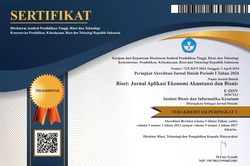TECHNOLOGY-BASED MARINE WORKERS BUSINESS SYSTEM: THE POTENTIAL OF THE SLEREK SYSTEM SPRINGS AS A MODEL
DOI:
https://doi.org/10.37641/riset.v4i1.140Keywords:
business system, technology, marine worker, fisherman, MuncarAbstract
The problem of poverty in fishing communities has become a cultural cycle. The issue has become a long causal chain of various aspects that is difficult to unravel over the years. The number of fishers is decreasing while the potential of marine resources has not been fully explored. It happens because poverty alleviation for fishing communities is only around 1% per year. The poverty alleviation program is closely related to the empowerment of fishing communities in running their businesses. So far, the fishing community's business problems have focused on weather/climate, infrastructure, technology (very little touched/used), and capital. However, not all fishing communities are not prosperous. There are different levels of exploration of marine potential in other areas. The Muncar fishing community is included in the successful category with Indonesia's second-largest business scale. The Muncar fisherman's business system, although applying the general Juragan-Worker method, has a traditional fishing method called Slerek, a boat system in pairs, one for fishing, the other providing accommodation. The Slerek system promises optimal catch. The catch-sharing system is 50:50 for the skipper and his group of workers. The Muncar fishing community business system can be adopted into an empowering marine worker business system after several modifications and adjustments have been made regarding the remaining problems.







